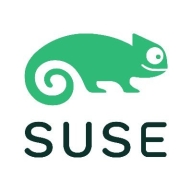

SUSE Linux Enterprise and CentOS are two prominent Linux distributions competing in the enterprise Linux domain. SUSE Linux Enterprise seems to have the upper hand in enterprise-specific features and support, while CentOS stands out with cost-effectiveness and stability.
Features: SUSE Linux Enterprise offers the YaST tool for centralized server management, AutoYaST for automated deployment, and robust high availability features which are crucial for enterprise environments. It also integrates seamlessly with SAP HANA, enhancing enterprise operations. CentOS is valued for its stability, minimal updates, and compatibility with Red Hat, making it a reliable choice for those prioritizing long-term support and security without licensing fees.
Room for Improvement: SUSE Linux Enterprise could benefit from modernizing system management tools and simplifying multi-cloud environment support. Cost concerns and the need for more comprehensive documentation are also noted. CentOS faces challenges with version support, a need for a better GUI, and potential stability impacts due to recent organizational changes.
Ease of Deployment and Customer Service: SUSE Linux Enterprise provides extensive support options, including 24/7 assistance, and handles multiple cloud environments despite an initial learning curve due to unique tools. CentOS is commonly used in on-premises settings with ample community support, though its cloud deployment support is less comprehensive, and reliance on community support can be limiting.
Pricing and ROI: SUSE Linux Enterprise requires a paid subscription, offering ROI through compatibility with enterprise systems like SAP, though its pricing is higher than some competitors. CentOS, as an open-source solution, incurs no licensing fees, making it cost-effective for enterprises wanting stability and community support, though this comes with limited access to professional support.
I have seen a return on investment, particularly in terms of money saved because I do not pay for the servers.
The money saved was significant, approximately fifteen percent of our IT budget.
It saved a lot of time through troubleshooting, which gives us substantial room for improvement in terms of fixing things.
I have seen a return on investment by switching our clusters from on-prem to Azure public cloud, using our same Bring Your Own Licenses, which saved costs on licensing.
I would rate the customer support for CentOS a 10 on a scale of 1 to 10.
I've seen many people across the globe interacting, and when users encounter issues, the community provides solutions.
I would rate the documentation about eight in terms of usefulness.
SUSE Linux Enterprise provides a stable, secure, and well-supported platform for enterprise workloads, with powerful management tools and robust support for clustering, cloud, and containers.
The customer support is good; whenever we have opened a case, they have provided detailed explanations of the issues and resolutions.
I rate the customer service 10 out of 10 because SUSE has 24/7 availability support, extended support, security, multi-Linux distribution support, upgradation, and everything is user-friendly.
CentOS is scalable and user-friendly without requiring complex configurations.
It allows users to scale resources vertically for upgrading hardware and horizontally by adding more servers, making it suitable for modern web hosting and containerized applications.
CentOS's scalability for my organization has handled growth and changing needs smoothly.
Its scalability is quite good since we are using Azure, which allows us to easily scale up or down our resources as needed.
SUSE Linux Enterprise is widely recognized for its strong scalability, making it suitable for organizations of all sizes, from small businesses to global enterprises.
CentOS is stable, reliable, flexible, and very useful.
CentOS's simplicity and stability make it easy to use.
I believe CentOS is stable, but we are gradually moving away from it.
When HANA is utilized by many applications, I notice that while utilization does increase, we have never faced lagging or server unresponsiveness.
I would rate stability for SUSE Linux Enterprise an eight out of ten.
The documentation and support could be improved, along with compatibility with newer hardware as hardware continually evolves over time.
Kernel parameters, sysctl config details, tuned profiles, process prioritization, optimized disk, and input scheduler choice are all points for performance optimization.
CentOS RADIUS server handles sensitive authentication data, so improving security is the priority.
Security is a top concern, and further strengthening default security policies, simplifying compliance management, and integrating advanced vulnerability management tools would be a valuable improvement.
The software manager was different, making it challenging to install certain applications.
The license we subscribed to should carry over within the same instance family.
There was no cost in terms of deploying it or getting the license for it.
CentOS is a free product with free updates.
The enterprise subscription cost is at a certain level, but CentOS saves customers from paying additional money, optimizing costs for enterprises and startups involved in application development.
Upgrading an instance results in overlapping or double subscription fees.
I would rate pricing for SUSE Linux Enterprise considering one is a high price and ten is a low price.
The licensing cost is a bit high.
CentOS has helped me most through its enterprise-level stability.
The update cycle changed when CentOS was prioritized for updates, causing stability issues.
In my experience, the best feature that CentOS offers is the network configuration of a device from the command-line interface, which is exceptionally clean.
SUSE Linux had a clean user interface, which was a valuable feature for me.
It has a stable and reliable OS.
The LVM is very easy to configure, along with simple disk scanning compared to other systems.
| Product | Market Share (%) |
|---|---|
| SUSE Linux Enterprise | 5.8% |
| CentOS | 4.4% |
| Other | 89.8% |


| Company Size | Count |
|---|---|
| Small Business | 30 |
| Midsize Enterprise | 22 |
| Large Enterprise | 28 |
| Company Size | Count |
|---|---|
| Small Business | 8 |
| Midsize Enterprise | 11 |
| Large Enterprise | 22 |
CentOS offers a stable, secure, and compatible environment with Red Hat packages, providing robust performance and cost efficiency. Its lightweight, scalable design and strong community support make it ideal for handling heavy workloads with limited resources.
CentOS is a popular choice for organizations seeking reliable server and virtualization solutions. Known for its robust stability and security, it offers seamless integration and maintenance. However, after a shift from Red Hat, some challenges emerged, including weak NFS client performance and a more complex interface, which beginners find challenging alongside insufficient documentation. Despite these, CentOS remains a favored option for deploying web applications, server installations, and supporting cloud solutions, thanks to its efficient use in monitoring, databases, and telecommunications.
What are CentOS's key features?CentOS is widely used in industries requiring robust infrastructure, such as web hosting, scientific computing, and telecommunications. In data centers, companies deploy it to support virtual environments, testing, and development. The OS powers business applications, email servers, and cloud solutions, offering a cost-effective alternative to Red Hat.
SUSE Linux Enterprise offers features like YaST for server management, seamless integration with Oracle and SAP, and a robust security setup. Renowned for stability, it efficiently supports workstations, SAP workloads, and cloud migrations across diverse industries.
SUSE Linux Enterprise is known for its lightweight design, high performance, and ease of installation. Its flexible architecture supports extensive documentation and efficient patching. The system uses the BTRFS file system for effective virtualization, and community support is significant. However, challenges include package updates causing conflicts, difficult initial setup and software management, high pricing, and support response times. Improvements in security compliance, cloud integration, hardware compatibility, and documentation are also needed.
What are SUSE Linux Enterprise's important features?
What benefits should users expect from using SUSE Linux Enterprise?
Industries like healthcare and banking use SUSE Linux Enterprise for secure transactions and structured application deployment. It is also a choice for organizations involved in testing, automation, and web development, offering support for SAP HANA integration and facilitating cloud migrations.
We monitor all Operating Systems (OS) for Business reviews to prevent fraudulent reviews and keep review quality high. We do not post reviews by company employees or direct competitors. We validate each review for authenticity via cross-reference with LinkedIn, and personal follow-up with the reviewer when necessary.